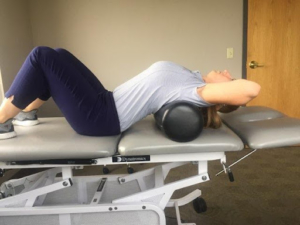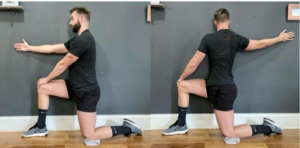We runners (hopefully) think about our leg strength and core strength. Perhaps even occasionally our arm strength when summer hits. What is often neglected, however, is our spine. To think about the spine as one thing takes away from what it is — 364 joints, with ligaments and many layers of supportive muscle surrounding a large part of our nervous system. AND this whole enchilada is supposed to move. While strengthening the muscles of our back is highly recommended and will likely have a beneficial influence on our posture, we have to allow our spine to move from the rigid position our mother has been telling us to hold for so long. We say move it: bend forward, backward, lean and turn.
Why spine mobility?
I am sure many of you have been called out directly, heard a running buddy mention it, or explored a Google search, but the phrases ‘run tall’, ‘chest up’, ‘shoulders back’ are for better or worse a staple when talking about running form. Having adequate strength and mobility in our back is key to achieve this sought after positioning. There are certain areas in our spine that will need a larger range of motion during running, while other areas need more muscular stability.
Where in the spine?
Specifically, when we have limited motion in our thoracic spine (the twelve vertebrae down from the base of our neck) this alters how our body accepts load when we run. This in turn results in a larger possibility for injury. By having more extension and rotation in our thoracic spine we can improve our running efficiency in a couple ways. First let’s talk breath.
Our ribs our connected to thoracic vertebrae, so more motion in our spine directly impacts our rib cage, allowing us to breathe deeper with more chest expansion. Which ultimately means we assist our aerobic capacity to keep moving at those faster speeds. The other part of good thoracic motion, rotation, allows for reciprocal movement from your arms to your pelvis. That’s what happens when we run! When this motion is normalized our lumbar spine (aka our lower back) is able to capitalize on all our solid back and core strengthening to lead to strong efficient running.
Ideas for Improving Upper Spine Motion
There are many exercises to improve motion in the thoracic spine, but below are a few favorites. If you would like some help and guidance keeping your spine healthy, mobile, and strong, or to keep moving into your next running adventure, please don’t hesitate to reach out to Sapphire Physical Therapy team. We have your back too!
Thoracic Extension Over Foam Roller
 Place foam roller below shoulder blades, hands cradling head then gently fold back. Hold for several seconds then return to start. Can move foam roller farther up spine toward head for different areas of upper back. Avoid overarching the low back. Test out a couple sets of 6 reps to begin.
Place foam roller below shoulder blades, hands cradling head then gently fold back. Hold for several seconds then return to start. Can move foam roller farther up spine toward head for different areas of upper back. Avoid overarching the low back. Test out a couple sets of 6 reps to begin.
Half Kneeling Thoracic Wall Sweeps
 Use hand to slide a big arch along wall so chest is facing the wall. Hold for several seconds. Then return to start and repeat. Trial 6 reps per side to start.
Use hand to slide a big arch along wall so chest is facing the wall. Hold for several seconds. Then return to start and repeat. Trial 6 reps per side to start.
Band Resisted Wall slide with Foam Roller
 Keep pressing out into the band while rolling foam roll up and back to start. Avoid arching low back. Try a couple sets of 12 reps to start.
Keep pressing out into the band while rolling foam roll up and back to start. Avoid arching low back. Try a couple sets of 12 reps to start.
References:
Preece, Stephen J, Duncan Mason, and Christopher Bramah. “The Coordinated Movement of the Spine and Pelvis during Running.” Human Movement Science. 45 (2016): 110-18. Web.
Doma K, Deakin GB, Sealey RM. “The reliability of lower extremity and thoracic kinematics at various running speeds.” Int J Sports Med. 2012; 33(5):364-369.





